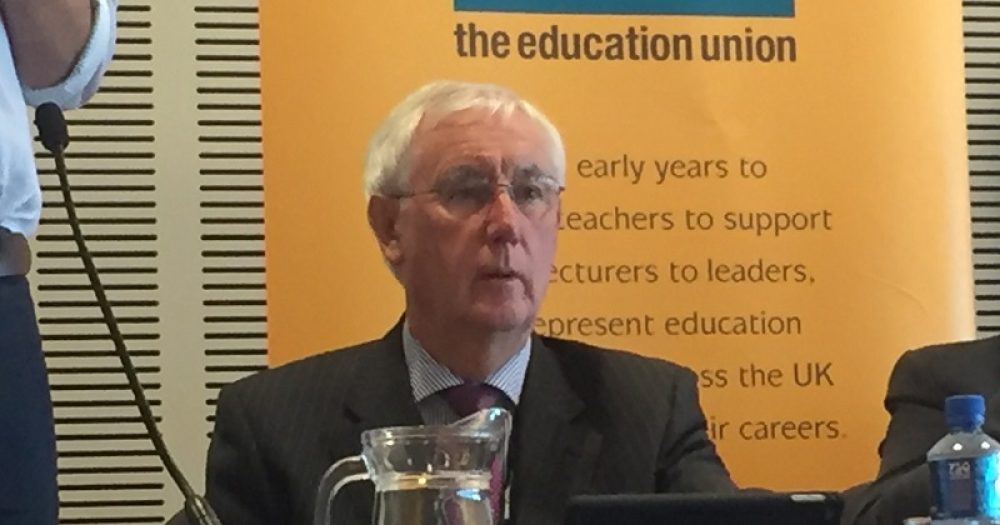The chair of the Education Funding Agency’s advisory board has cast doubt on plans to convert all schools into academies and questioned proposals for more grammar schools.
Les Walton, who also chairs the Northern Education Trust, told a fringe event organised by teaching unions at the Labour Party Conference that the government had to be “sensible” about what could be achieved in the next five years.
Walton’s comments, which he insisted were based on his personal views and not those of the EFA, follow several other indications the government could be attempting to row back on previous pledges to achieve full academisation in the near future.
An original plan to force all schools to become academies by 2022 was abandoned by Nicky Morgan earlier this year, but her successor Justine Greening has said she still expects to see schools opting to convert of their own accord as ministers focus on those which are “struggling”.
Walton, who was first appointed by Ed Balls to chair the Young People’s Learning Agency in 2009 and then re-appointed by Michael Gove to lead the advisory board of its successor, the EFA, in 2012, said the schools sector had to look at the “trajectory” of the academies programme.
“When I was appointed by Ed Balls I was asked to take over 221 academies. There’s now 5,000. There’s still 17,000 to go. Therefore if we continue with that trajectory, we probably won’t get to 22,000 in the next five years,” he said.
“I think we’ve just got to be sensible about what can be achieved and what can’t be achieved. “
Walton also appeared to criticise plans unveiled recently by the prime minister to create new grammar schools, adding that his own experience of being in a grammar school, secondary modern and “one of the first comprehensive schools” gave him an unusual insight.
“I hated my grammar school,” he said. “The trouble is, everybody who talks about grammar schools who wants them back are the ones who achieved well at the grammar schools. So we’ve got to start talking to people like me who didn’t do very well.
“We’ve got to get to the reality of what grammar schools were like. When grammar schools were at their peak in the 50s, you weren’t allowed to be homosexual, you would’ve been still able to be killed if you were a witch and we lost the Suez Canal. Life is not the same.”
He also raised concerns about proposals to force independent schools and universities to run schools.
“We can learn from the private sector, we can learn from the independent sector, we can learn from universities, but why have we got such low self-esteem that as schools we can’t learn from ourselves?” he said.








He’s right about what grammar schools were like in the 50s and 60s. 3 of our pub quiz team (incuding me) went to 3 different grammar schools in those decades and while we did OK and enjoyed some aspects of them we remembered things like rampant corporal punishment; teachers chain smoking through lessons; a teacher called Flash because of how quickly he got away at the end of each school day; a teacher breaking down in tears due to what we would now call PTSD due to his wartime experiences; teaching consisting of issuing old O level papers for two years; teachers reading out the notes they made at university many years before which had to be copied down by pupils; eccentric teachers who would never pass their probationary year these days. Ah! Ou sont les neiges d’antan? (I did French but only after I’d also done woodwork and metalwork).
I echo the sentiments expressed by Mr Marriott above. I attended 2 grammar schools in the 1960s. In the first I was systematically assaulted almost on a daily basis by God’s SAS, the Christisn Brothers. The leather tawse was their weapon of choice, and the Latin teacher frequently used to rap boys on the temple with a gnarled knuckle.PE lessons often consisted of “four laps”, which meant that we had to run round the school perimeter four times, along busy main roads and through a park, unsupervised because the PE teacher had retired to his office to read the paper. He’d worked out that four laps of the school plus changing time just about used up a single lesson. I transferred to a non-denominational boys’ grammar school which was marginally better, but the teaching, in retrospect, was wildly inconsistent. There were one or two inspirational teachers and one or two eccentrics who should never have been let near a classroom, and a PE teacher who would wait behind the gym door for the last boy in and beat him across the back with the butt end of a climbing rope. Life was indeed different then, and this government’s benighted obsession with structures completely misses the point and ignores the main issues ccnfronting schools today – recruitment, retention, catastrophically shambolic assessment at all levels, fair funding, 8% cuts in real terms, the professional development of teachers, to name but a few. You can call schools whatever you like, but until you invest in world-class teaching and learning, you’l get good grammar schools and bad grammar schools, just as we have good academies and free schools and terrible academies and free school now, and good comprehensives and bad comprehensives. ‘Twas ever thus. This announcement by Theresa May, our new Secretary of State for Education and Everything Else, is a smoke screen to divert attention from the omnishambles developing in the Department for Brexit. Here we are 3 months on from the referendum, and they have no landlines in their basement office, where they can’t get a mobile signal. Bodes well, doesn’t it?
We also need to remember that Secondary Moderns were at least as, or even more brutal.
Les Walton is right – the world is now very different from the high watermark of grammars. In the 50s and early 60s, the only schools offering exams were grammars so those pupils who went to them and actually took O levels at 16 can indeed say the grammars gave them opportunities denied to the majority of children who left school at 15 with no qualifications. The ‘superiority’ of grammars, therefore, wasn’t the quality of teaching (which could, as noted above, be nothing but copying notes from the board) but access to exams.
That gradually changed as more secondary moderns realised they had pupils capable of taking O levels and encouraging them to stay on until 16. At the same time, parents grew increasingly angry that their child had but one-in-four chance of going to a school which offered exams and could be labelled at age 11 as ‘not bright’.
Grammars are now obsolete – we should be arguing for their abolition not extension.
You must be disappointed that so few people agree with you.
To use the figures from the recent YouGov survey that you selectively quote from on other threads, only 23% agree with you that they should be abolished. More than one and half times that number (38%) want to create more grammar schools and a similar number to the abolishers (22%) want to keep the status quo. So 60% (which interestingly equates to what Jeremy Corbyn supporters would call a ‘huge mandate’) support grammar schools.
Still, why bother to listen to the people eh?
Because most people don’t actually understand the implications of selection and have not been provided with the evidence on which to make an informed judgement. Whilst most people might think grammar schools themselves could be beneficial few go beyond that to consider the impact on the 75 to 80 % of children who would be attending secondary modern schools if selection were to be expanded.
Too many people have swallowed the myth that grammar schools help social mobility. If they knew that wasn’t the case one would assume the support would diminish.
Alternatively the support is coming from middle class parents keen to buy into socially segregated schools for less than private school would cost.
Take your pick.
The YouGov poll actually showed 40% were not in favour of new grammars. (23% in favour of abolition of grammars + 17% in favour of keeping remaining grammars but against the establishment of new ones). This slightly exceeds the proportion (38%) who were in favour. 22% didn’t know whether or not to set up new grammars.
Odd that I should be accused of selective use of data when I reported the findings in full here: http://www.localschoolsnetwork.org.uk/2016/08/support-for-new-grammars-falls-latest-yougov-poll-reveals
By the way Janet, you did indeed report the full findings in your LSN blog (the one that I pointed out ended up by plugging the book that you’re selling, and also the one that quoted the wrong figures for the 2015 survey).
However in my post above I referred to various Schools Weeks threads (such as http://schoolsweek.co.uk/teachers-reject-government-grammar-proposals/) in which you refereed to “only 38% of the population supported new grammars being built” without mentioning any of the other statistics.
Sarah – a recent YouGov poll found 35% believed grammar schools were good for social mobility; 27% thought they made no difference; 20% didn’t know and just 19% thought they were bad.
But, as you say, the evidence (as opposed to opinion) shows they didn’t help social mobility in the ‘golden age’ of grammars and they don’t do so now. In areas where grammars still exist, disadvantaged pupils do worse than in comprehensive areas.
In any case, education’s effect on social mobility is limited. It depends more on secure employment which pays well enough for people to afford to purchase a home and social policies which help relieve poverty.
How condescending is that!
So when a poll shows that the majority of people disagree with you it’s because the uninformed general public don’t know all the facts and so can be ignored, whilst you and your opinion should reign supreme.
Funny how when the results of a poll support your views there is no mention of the possibility that the public don’t understand the situation.
Janet – let’s dial back a bit. You said “Grammars are now obsolete – we should be arguing for their abolition not extension”.
The figures show that only 23% of people agree with you, whilst 55% support grammar schools (this is a mix of people who want more and people who want to retain the ones we’ve got).
So twice as many people oppose your argument as support it.
That’s the reality of the situation
Even if a majority of people supported the reintroduction of grammar and secondary modern schools one would expect evidence on the likely impact to be given significant weight in deciding whether to pursue the policy. So, it’s not about ignoring anybody, it’s about balancing up the views of important but non-expert stakeholders with the available research from those with expertise and deep knowledge. Policy should be evidence based. If it can be popular too then that’s a bonus.
So the will of the people can be overridden if the ‘experts’ (which I presume you count yourself among) disagree with them?
However it should come as no surprise to anyone that in reality there is no absolute consensus when it comes to what the evidence is. The Guardian (hardly a mouthpiece for Mrs May and the Conservative Party) published an article on the 11th about how the experts are divided: https://www.theguardian.com/education/2016/sep/10/grammar-school-plan-divides-experts
Of course I agree with you that the debate must take appropriate account of those with expertise and deep knowledge but it does the debate no favour to pretend that all such people are squarely lined up on one side of the discussion.
Mark – It is also true that the popularity of May’s push for more grammar schools is declining as the public becomes increasingly better informed. This trend is likely to accelerate now that the Labour opposition is at last getting its act together, led so well by Angela Rayner. With an increasing number of her own MPs, the Lib Dems, SNP, Plaid Cymru and the Greens also opposed, May has only UKIP providing support. The social mobility question is addressed in this article
https://rogertitcombelearningmatters.wordpress.com/2016/08/19/bringing-back-grammar-schools-would-lower-the-national-iq/
Roger, I could equally say that as the public becomes better informed the popularity of abolishing grammar schools is declining – in the last 12 months the percentage of those wanting to abolish grammar schools fell by the same amount as the percentage of those wanting to increase the number of grammar schools. In fact, the reduction in both these categories simply moved to the “don’t know” category which grew by 4% – I would suggest this indicates that the public is now less informed.
And I’m sorry, your comments on the other political parties might relate to Westminster MPs (where politics is more important than anything else), but looking at the YouGov survey results 39& of Lib Dem voters support the creation of more grammar schools, compared to 22% who want to abolish them. (YouGov haven’t set out the figures for SNP, Plaid Cymru or the Greens).
BTW, I’m naturally highly suspicious of any article which plugs a book written by the author of the article. Always seems like a rather blatant conflict of interest (although the fact that you link so much to Local Schools Network where they do the same thing is, at least, consistent).